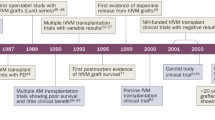Abstract
Neural transplantation, as a therapeutic approach to Parkinson’s disease, still requires allogeneic graft material and raises questions of immunosuppression and graft rejection. The present study investigated the time course of major histocompatibility complex (MHC) expression and astrocytic response in allogeneic dopaminergic grafts, comparing two different grafting protocols. Adult 6-hydroxydopamine-lesioned Lewis 1.W rats received intrastriatal cell suspension grafts from the ventral mesencephalon of DA rat fetuses, either as single 1-μl macrograft via metal cannula or as four micrografts of 250 nl/deposit via a glass capillary. No immunosuppression was administered. Immunohistochemistry was performed at 1, 3, 6, and 12 weeks after grafting, using antibodies against donor- and host-specific MHC class I and II antigen, glial fibrillary acidic protein (GFAP) and tyrosine hydroxylase (TH). Most animals showed good allograft survival up to 12 weeks after transplantation with no signs of rejection. Reinnervation of the lesioned striatum by TH-positive neurites was observed from 3–6 weeks on. Expression of donor-specific MHC class I was comparably low in both allogeneic grafting groups, while host MHC class I and II reaction as well as astrocytic response tended to be higher in the macrografted animals. Donor MHC class II was not observed at any time point. It is concluded that intraparenchymal allografts of fetal mesencephalic cell suspensions can survive well in the rat Parkinson model without immunosuppression for at least 12 weeks, and that the expression of moderate amounts of donor-specific MHC class I antigen does not suffice to initiate a rejection process. In addition, the microtransplantation approach may reduce the level of trauma and subsequent MHC and GFAP expression and may, thereby, minimize the risk of graft rejection.
Similar content being viewed by others
Author information
Authors and Affiliations
Additional information
Received: 14 May 1997 / Revised, accepted: 17 July 1997
Rights and permissions
About this article
Cite this article
Brandis, A., Kuder, H., Knappe, U. et al. Time-dependent expression of donor- and host-specific major histocompatibility complex class I and II antigens in allogeneic dopamine-rich macro- and micrografts: comparison of two different grafting protocols. Acta Neuropathol 95, 85–97 (1997). https://doi.org/10.1007/s004010050769
Issue Date:
DOI: https://doi.org/10.1007/s004010050769




